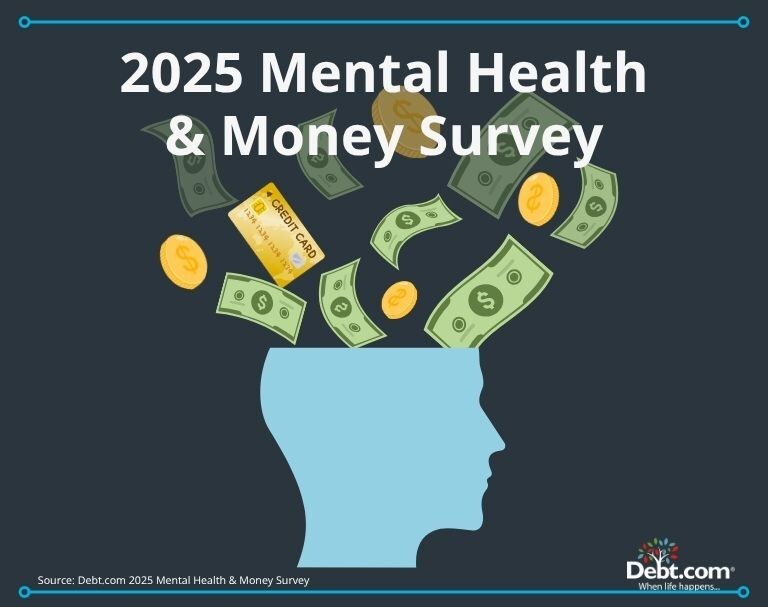A Debt.com survey finds that big balances and steep interest rates are costing Americans much more than money.
FORT LAUDERDALE, Fla., May 29, 2025 /PRNewswire-HISPANIC PR WIRE/ — Debt.com’s annual Mental Health & Money Survey reveals dramatic increases in negative emotions and behaviors from 2022 to 2025, despite inflation being significantly lower today (2.3%) compared to three years ago (6.5%).

The primary culprit appears to be credit card debt. When asked how credit card debt affects their social life, just over 10% of respondents in 2020 said, “I avoid going out with friends or family.” This year, that number more than doubled to over 23%.
The impact extends to dating as well. In 2022, only 5% reported avoiding dating due to credit card debt. Today, that figure has climbed to over 13%.
“Inflation might have dropped, but the damage is done,” said Howard Dvorkin, CPA, chairman of Debt.com. “Credit cards are the most widespread form of debt, which means they leave the deepest scars. You can’t always see them, but they can linger for years and affect millions of Americans.”
Survey results from 1,000 Americans further support Dvorkin’s concerns, revealing troubling trends in emotional well-being tied to financial stress. When asked how they feel while reviewing their credit card bills and what emotional triggers prompt them to spend, the responses revealed concerning trends.
Emotional Distress Linked to Debt Has Surged Since 2022
- In 2022, only 6% reported feeling hopeless — by 2025, that number jumped to nearly 22%
- Feelings of sadness rose from almost 7% in 2022 to 22% in 2025
- Reports of losing sleep over debt more than quadrupled, from just over 2.5% to 13%
Majority Link Credit Card Use to Emotional Stress and Anxiety
- 71% of respondents say the convenience of credit cards negatively impacts their mental health
- 43% feel stressed after using their cards
- Nearly 40% avoid reviewing their monthly statements due to anxiety
- 25% admitted to applying for a credit card while already feeling sad or stressed
Credit card debt isn’t the only financially motivated mental health issue. This year’s survey also asked about lingering inflation and student loan debt.
Inflation Stress Spills into the Workplace and Daily Life
- 74% report feeling anxious
- 23% say it affects their focus at work
- 7% report being unable to eat
The Weight of Student Loan Default: Fear, Action, and High Balances
- 88% of borrowers with defaulted student loans worry about wage garnishment or loss of tax refunds
- 68% have taken proactive steps like enrolling in repayment programs or setting aside money monthly
- Nearly 1 in 4 borrowers owe more than $50,000
“Our mental health is deeply connected to our financial health,” Dvorkin added. “The more we talk about this and give people resources to manage their debt, the more we reduce the emotional burden of money stress.”

Photo – https://mma.prnewswire.com/media/2698346/Debt_com_survey_2025.jpg
Logo – https://mma.prnewswire.com/media/1576979/Debt_com_Logo.jpg
SOURCE Debt.com







